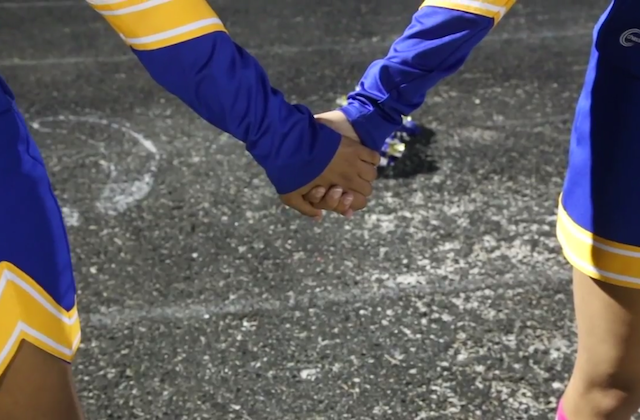A group of Black cheerleaders at South Robeson High School in Robeson County, North Carolina, joined a national conversation about athlete activism—and became targets of vitriol—when they kneeled before a football game in September. An article published by The Associated Press today (December 5) examines the action and how it impacted residents in what the outlet calls “the most racially diverse rural county in America.”
The U.S. Census Bureau‘s latest statistics show Robeson County residents are 41 percent Native American, 24.2 percent Black and 31.3 percent White. Just over half of the county voted for President Donald Trump in the 2016 presidential election.
The AP reports that the cheerleaders’ action didn’t cause problems until the parent of a player on the opposing team circulated a photo on social media. The ensuing outrage included called for the girls to be reprimanded.
One of the protesting cheerleaders, 14-year-old Aajah Washington, said that she and her teammates decided to kneel after President Donald Trump refused to condemn White supremacists following the deadly Unite the Right rally in Charlottesville, Virginia. “I watch TV every day and that’s all we see, police brutality or the KKK is coming out,” she told The AP. “It just seems like the world is changing, where everything from back then is coming back now.”
Tiona Washington, Aajah’s mother, understands that the racism that her daughter sees has far deeper roots in the area. She recalls a childhood in which her own mother, Edith Washington, would make her duck when they drove past torch-bearing Ku Klux Klan members. The eldest Washington recounted being one of the first Black students at the newly integrated high school in Rowland, North Carolina (which lies in Robeson County) in 1971. Railroad tracks still separate Rowland into what locals call the “Black” and “White” sections of town.
The AP also spoke with former National Football League (NFL) player and local hero Vonta Leach, who sponsors a free football camp for children in Rowland. Leach recounted a moment a few days before the girls’ protest, when local paper The Robesonian asked him about Trump’s criticism of protesting Black NFL players. The article was titled, “Leach: I would have kneeled.”
“Some of the comments were, ‘He ain’t nothing but an ‘N,’” Leach said about the backlash.
The Robesonian editor Donnie Douglas also encountered that blowback in comments and reader letters. Douglas said that the article about Leach generated more anger than another from the same issue that discussed a Confederate monument that still stands outside the county courthouse. “If you’re offended by the knee, then you ought to be able to understand why people are offended by that Confederate soldier up there,” he said.
South Robeson High principal Christopher Clark, who is Native American, discussed the letters he received, which demanded his resignation for his students’ action. One of his friends wrote: “You don’t have the guts to lead.”
Clark, despite his own misgivings, defended his pupils’ right to demonstrate. “When we start down the road of ‘the other’—the other is wrong, the other is un-American, the other, the other, the other—where will we stop?” he asks. “There will be a day when we look back on this and think: What in the world happened to us?”
The AP also published this companion video piece, which features interviews with residents about the demonstration:
